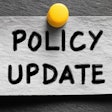By the time a person reaches middle age (around 40), his or her personality is pretty much set in stone. That's something that radiology business administrators need to keep in mind when they seek to create governance guidelines for their medical groups.
"Governance is the structural process and rules, established by a group, that will guide the group's behavior and steer the organization," said consultant Will Latham of Latham Planning in Chattanooga, TN. "We're not changing personalities. We're changing behavior and that's what governance is about to a certain degree."
At a talk at the 2007 Radiology Business Management Association (RBMA) meeting in San Francisco, Latham outlined a strategy for creating and implementing governance at a medical practice.
Physicians as people
While governing a practice doesn't involve making people over, it does require some understanding of the how personalities influence the way the practice runs. These personalities then play into group dynamics, which is one of the main reasons that good governance is hard to achieve, Latham said.
There are four stages to the development of group dynamics, according to Latham: forming, storming, norming, and performing.
During the forming stage, group members will look to the leader to guide them. Storming is when personalities clash and conflict ensues, with people often turning their hostility on the leader. Norming comes when group members accept the team, the leader, and the guidelines that have been established. Finally, a stabilized group can concentrate on performing, such as problem-solving and decision-making.
Unfortunately, many medical groups stall in the forming stage, Latham said. Administrators must be hip to the fact that they are, on the whole, dealing with people who are mistrustful of organizations and work on a certain level of paranoia attitudes. In addition, physicians tend to be poor communicators with a low level of emotional intelligence.
"Physicians are conflict avoiders (and) this is very important in the need for governance," he said. "If we said, 'We're going to have a meeting. There's going to be a lot of conflict. Who wants to go?' how many people would volunteer?"
"Emotional intelligence is a new theory," Latham added. "It has to do with being able to work cooperatively. Having skills like self-awareness, self-motivation, and empathy. Many physicians have high IQ and fairly low EQ."
What options does an administrator have to address conflict management and lead a group to the performing stage? It depends on what role he chooses to play in this process: the conqueror ("I win -- you lose"), the avoider ("I lose -- you lose"), the accommodator (I lose -- you win"), or, the ideal, the collaborator ("I win -- you win").
The collaborator would encourage the group to focus on building relationships, share information with the group and vice-versa, and works with others to seek solutions.
Decision-making
Even the best collaborator needs an effective system in place to make governance happen. One major glitch in that system can come with the decision-making process lacks any direction. This can happen for various reasons, but most often occurs because there's an attempt to have unanimity at all costs.
"Have you ever wondered why your group talks an issue to death? Why you seek unanimity on all issues? Have you ever wondered why everyone has to weigh in on every issue? Have you ever wondered why you have poor meeting attendance? Or a lack of implementation (of governance)?" Latham asked the RBMA audience.
Administrators need to answer three important questions about their decision-making process:
- How will the group make decisions (unanimity versus consensus versus majority rules)?
- What is expected of each physician once a decision has been made by the group?
- What are a physician's options if he or she does not like the decision?
While tackling the first question isn't difficult, the last one is a stickier wicket, Latham said. In theory, a physician has three responses to a group decision that she is unhappy with:
- Follow the rule because it is a group practice.
- Try to change the rule through proper channels.
- Leave the group.
But there is another nonoption that many people opt for -- noncompliance.
"Most medical groups, large or small, suffer from a dirty little secret. There's always the doctor who knows that if he brings something up over and over again, he can torture the group into submission. 'I don't like a decision and I didn't vote for it, so I don't have to do it,'" Latham said.
Before even beginning the process of making governance a reality, an administrator should take a look at his practice for the answers to these questions about decision-making, he stated.
Policy formation
Looking at the big picture, it's incumbent upon the administrator to ensure that the practice is focused on their mission and vision. On a day-to-day basis, responsibilities as they pertain to governance include oversight of strategic goals, dealing with problem physicians, and evaluating management, as well as the performance of the governing body (board of directors, etc).
"Here is the difference between leadership, governance, and management," Latham said. "What many groups do from their governance standpoint is that the physicians sit around and make decision after decision, when what they really should be doing is state policy: 'This is the way we are going to treat these types of issues as guidance for management.'"
"The management can then use their creativity to implement the policies development by the physicians. Whether you are a small or large group, your governance should be developing policy and leaving it to management (to implement)," he added.
One key to proper policy management is communication and, indeed, "overcommunication," Latham said.
"Physicians are paranoid about giving up autonomy. It's difficult for them to give up authority to someone else," he explained. "But the price of (a governance body's) authority is communication."
By overcommunicating, Latham suggested that a manager keep physicians informed on all aspects of governance in as many ways as possible: fax, e-mails, newsletters, and voicemail. Meeting agendas should be sent out in advance, and meeting minutes should be distributed in a timely fashion.
Finally, in terms of governance for the board and the management, using benchmarks and stated goals can serve as indicators as to where the practice is heading. Benchmarks can include such nitty-gritty issues as gross charges, net collection percentage, full-time equivalent staffing levels, and budgeted versus actual expenses.
Goals can assess by referring back to the group's vision and mission statements. According to Latham, a question a governance body should ask itself on a regular basis: "Is this taking us toward our vision?"
Meeting management
Latham also offered some tips for setting up a governance board:
Reduce the number of people involved in decision-making and aim for no more than seven board members.
Establish an effective election process. Latham suggested that members not rotate in and out of the governance board. Instead, have all members vote with a secret ballot until a majority is reached.
Avoid setting up too many committees. Each committee should have a definitive role. The administrator should attend every committee meeting for information and oversight.
The group should agree on a leader and authorize the ground rules for all meetings.
"I've seen groups squander tremendous opportunities because they can't work together," Latham said. "We can't afford the luxury of doing it the way we used to do it -- disjointed and happenstance. No medical group can be successful without effective governance."
By Shalmali Pal
AuntMinnie.com staff writer
March 2, 2007
Related Reading
Strategic planning: How to turn 'Kumbaya' into a communication event, February 13, 2007
IT governance in healthcare still evolving, August 5, 2005
Copyright © 2007 AuntMinnie.com



















